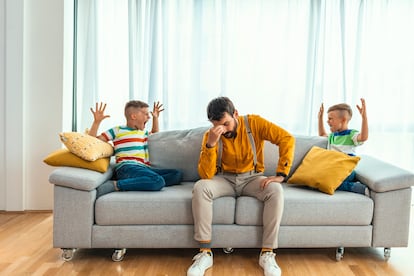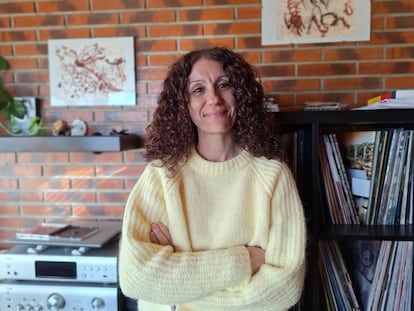What do I do when I feel like yelling at my kid? Four experts weigh in
Stress, not knowing how to deal with the situation and not understanding the child’s behavior can make parents lose their temper. Techniques such as leaving the room or learning to channel anger can be of help

To yell or not to yell. This dilemma is a constant in the daily life of any father or mother. While in the past yelling at your kids was seen as something normal, today this habit is frowned upon, not only by society, but also by the scientific evidence that has been claiming for years that it is harmful for the physical and mental health of the children. One example is a study called Yelling at kids comparable to physical punishment, published in 2015 by the Harvard Medical School, which concluded that “yelling – defined as shouting, cursing or insult-hurling – may be just as detrimental as physical punishment to the long-term well-being of adolescents.” Another, more recent one, made by the University of Cambridge in 2023, found that “shouting at children regularly, routine physical punishment [or] isolating children when they misbehave” increases the risk of developing lasting mental health problems.
With all this information, many parents feel negative emotions like guilt or regret when they yell at their children. This situation has led specialists in disciplines such as psychology or education to propose different guidelines to face this moment, which can be difficult to control; techniques that range from leaving the room to get some air to learning to channel anger to prevent it from happening. But how do parenting experts act with their own children? Can they manage without yelling? Four specialists explain how they behave at home, beyond all theory.
Ruth Alfonso Arias, early childhood educator

Early childhood educator Ruth Alfonso Arias (45 years old) is also a certified positive discipline educator for families. She has three children: a 13-year-old girl and 9-year-old twins. “Without a doubt, what drives me up the wall are the conflicts between my children. I find it very hard to manage and deal with, despite being aware that arguments between siblings are normal and should be considered something positive,” she points out. Another situation that pushes her to the limit, she says, is having to tell them every day to do the things they already know they have to do: “Shower, homework, to brush their teeth and so on. My children’s favorite word is ‘Wait.’ They always have something more important to do.” Nighttime is when she is most likely to lose her temper. “After a tiresome day, this is definitely the moment in which it is easiest for hell to break loose, when I can raise my voice or simply scold them for things that at another time I would have been more patient with.”
“It’s true that I don’t usually yell at them,” she continues, “but that doesn’t mean I never do it.” She admits that when she is feeling overwhelmed she cannot always control her tone of voice, “especially when I have repeated something several times and everything remains the same.” If she yells at her children, she usually regrets it or feels bad for not having handled things right. “When I make a mistake, I talk to them and ask for forgiveness if I have failed in some aspect. I think it is important to make them see that we all make mistakes and we must admit that we have done wrong. This helps us repair situations and learn.” Alfonso sometimes thinks that she could have avoided it by leaving the room to breathe for a moment. “Or delegating to my partner when I notice that I am about to lose my temper, making more time for myself to do things like exercise or just rest. When you are parenting, it is important to have those moments to recover and restart. To reduce your demands, both on yourself and on them; it’s okay if, for example, they don’t have a healthy dinner one day, or if they eat later. Sometimes you just can’t have it all.”
Sonia López, teacher, educational psychologist and lecturer

Psychopedagogist Sonia López (48 years old) is the author of El privilegio de vivir con un adolescente (in English: The privilege of living with a teenager). She has two teenage children, ages 16 and 18. “Accompanying two teenagers with serenity is not an easy task, because that is a very challenging stage for families. The two situations that cause the most conflicts are when they put off their responsibilities (say, leaving the house without having picked up their room) and when they try to overlook the limits that we have agreed upon (such as the time they should be back home). And they certainly cause me to sometimes lose patience and end up saying things that I regret,” says López. “In these situations – and I don’t always succeed – if I feel like I’m about to lose my temper and yell, I try to get away from the problem until I’m able to wind down.” When both parties are calmer, López tries to analyze the behavior that is not correct, share the emotions that arise in those situations and look for possible joint solutions so that it does not happen again. “Being aware that none of the inappropriate behaviors of my children have the objective of upsetting me, but they are the product of their brain, helps me not to react incorrectly towards them and to be more patient.”
Her advice is that fathers and mothers learn to breathe and anticipate the loss of control. That, she explains, is essential to avoid yelling or saying things that one instantly regrets: “In situations that I have not been able to stay calm and I have ended up yelling, lecturing or labeling, after I manage to calm down and analyze the situation with perspective I apologize without feeling ashamed.”
Rafa Guerrero, child psychotherapist
Child psychotherapist Rafa Guerrero (42 years old) is the author of books such as TDAH: Entre la patología y la normalidad (ADHD: Between pathology and normality) and Menudas rabietas: Cómo gestionar los problemas de conducta de manera respetuosa (What a tantrum: How to manage behavior problems respectfully). He has two children, ages 5 and 7. “A couple of weeks ago, at a conscious parenting conference in Guatemala, a teacher asked me about the biggest challenge that I’ve faced as a parent. Without hesitation, I told him that, at times, I tended to idealize the plans I made with my children,” says Guerrero. “If the plan was to go for a walk in nature or to spend the day at the beach, I used to come up with idyllic plans that are difficult to carry out with two small children, as they are not free of conflicts, arguments and bad moments.” The expert explains that this disparity between what he envisioned and what actually happened caused him a lot of frustration, “which caused constant anger, yelling and disappointment.” Guerrero admits that over time he has learned to adjust his expectations of the activities he does with his children, “so, even if they are not ideal or perfect, they are closer to what is expected of two small children.”
In these moments of discord, the yelling and the exasperation are not easy to control, he explains. “For this reason, the key is to know child development closely and adjust our expectations to the plans we make with them, no matter how simple or routine they may be, like going to have dinner at a restaurant.”
Eva Bailén, engineer

Eva Bailén (49 years old) successfully led the campaign for the rationalization of homework in the Spanish education system in 2015, and has three children, ages 17, 19 and 21. “The worst situations I remember happened when my three children were very young. Especially after the third was born, when there were no longer enough hands to take care of everyone,” she says. “The one who made me lose my temper the most was my son – the middle and only boy. [...] I remember one day when we were doing renovations at home and he threw a wild tantrum. He was lying on the ground, on the dust from the work, kicking, oblivious of the fact that he could hurt himself. These episodes were usually overcome by holding him and giving him a kiss. I tried that. I tried to get him to get up, talking to him calmly, but it didn’t work, and I was so overwhelmed that I couldn’t refrain from getting angry and shouting.” Bailén admits that she left awful afterwards, but it was just not possible for her to control her temper. When they grew up a little, he and his little sister often quarreled. “One afternoon, after listening to them argue for a long time, I thought that my daughter’s crying sounded too loud, even for her, and when I went to see what was going on I found him hitting her, and I thought it was too hard, and I got furious and yelled at him.” To her surprise, the girl went from crying to laughing, and even defending her brother: “Even today they remember that day and laugh at the situation and my anger. Maybe the smack wasn’t that big of a deal. I do believe that, if I hadn’t intervened, they would have made up perfectly.”
Sign up for our weekly newsletter to get more English-language news coverage from EL PAÍS USA Edition
Tu suscripción se está usando en otro dispositivo
¿Quieres añadir otro usuario a tu suscripción?
Si continúas leyendo en este dispositivo, no se podrá leer en el otro.
FlechaTu suscripción se está usando en otro dispositivo y solo puedes acceder a EL PAÍS desde un dispositivo a la vez.
Si quieres compartir tu cuenta, cambia tu suscripción a la modalidad Premium, así podrás añadir otro usuario. Cada uno accederá con su propia cuenta de email, lo que os permitirá personalizar vuestra experiencia en EL PAÍS.
¿Tienes una suscripción de empresa? Accede aquí para contratar más cuentas.
En el caso de no saber quién está usando tu cuenta, te recomendamos cambiar tu contraseña aquí.
Si decides continuar compartiendo tu cuenta, este mensaje se mostrará en tu dispositivo y en el de la otra persona que está usando tu cuenta de forma indefinida, afectando a tu experiencia de lectura. Puedes consultar aquí los términos y condiciones de la suscripción digital.









































